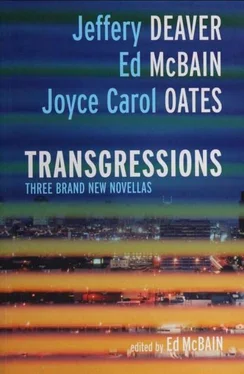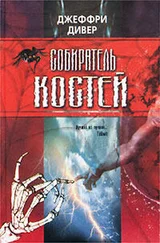Leah had stayed in Davitt’s apartment approximately a half hour.
Possibly, forty minutes.
No. They had not had sex.
Not exactly.
They had each had a drink. They had been affectionate, they had talked.
Earnestly, seriously they had talked! About the clinic, and about their children. About Davitt’s marriage, and Leah’s own.
(It would be revealed, Leah had led Davitt Stoop to believe she had been married, and divorced. It had seemed such a trivial and inconsequential lie at the time.)
Leah was saying, stammering, Davitt would never do such a thing! Not to Marissa, not to any child. He was the father of a ten-year-old boy, himself. He was not the type...
The female detective asked bluntly what did Leah mean, “type”? Was this a “type” she believed she could recognize?
Davitt forgive me! I had no choice.
I could not lie to police. I had to tell them about you. I am so very sorry, Davitt, you can understand can’t you I must help them find Marissa I had no choice.
Still, Marissa remained missing.
“People who do things like this, take children, they’re not rational. What they do, they do for their own purposes. We can only track them. We can try to stop them. We can’t understand them.”
And, “When something like this happens, it’s natural for people to want to cast blame. You’d be better off not watching TV or reading the papers right now, Miss Bantry.”
One of the Skatskill detectives spoke so frankly to her, she could not believe he too might be judging her harshly.
There were myriad calls, e-mail messages. Blond-haired Marissa Bantry had been sighted in a car exiting the New York Thruway at Albany. She had been sighted in the company of “hippie-type males” on West Houston Street, New York City. A Skatskill resident would recall, days after the fact, having seen “that pretty little pig-tailed blond girl” getting into a battered-looking van driven by a Hispanic male in the parking lot of the 7-Eleven store a few blocks from her home.
Still, Marissa remained missing.
...hours in rapid succession jarring and discontinuous as a broken film projected upon a flimsy screen she would not sleep for more than two or three hours even with sedatives and she slept without dreaming like one who has been struck on the head with a mallet and she woke hollow-headed and parch-mouthed and her heart beating in her chest like something with a broken wing.
Always as she woke in that split-second before awareness rushed upon her like a mouthful of filthy water My daughter is gone, Marissa is lost there was a sense of grace, a confusion in time like a prayer It has not happened yet has it? Whatever it will be.
Have You Seen Me?
Like a sudden bloom of daffodils there appeared overnight, everywhere in Skatskill, the smiling likeness of MARISSA BANTRY, 11.
In store windows. On public bulletin boards, telephone poles. Prominent in the foyers of the Skatskill Post Office, the Skatskill Food Mart, the Skatskill Public Library. Prominent though already dampening in April rain, on the fences of construction sites.
MISSING SINCE APRIL 10. SKATSKILL DAY SCHOOL/15TH ST. AREA.
Hurriedly established by the Skatskill police department was a MARISSA Web site posting more photos of the missing blond girl, a detailed description of her, background information, ANYONE KNOWING ANYTHING ABOUT MARISSA BANTRY PLEASE CONTACT SKATSKILL POLICE AT THIS NUMBER.
Initially, no reward was posted. By Friday evening, an anonymous donor (prominent Skatskill philantropist, retired) had come forward to offer fifteen thousand dollars.
It was reported by the media that Skatskill police were working round the clock. They were under intense pressure, they were investigating all possible leads. It was reported that known pedophiles, sex offenders, child molesters in the area were being questioned. (Information about such individuals was confidential of course. Still, the most vigilant of area tabloids learned from an anonymous source that a sixty-year-old Skatskill resident, a retired music teacher with a sexual misdemeanor record dating back to 1987, had been visited by detectives. Since this individual refused to speak with a reporter, or consent to be photographed, the tabloid published a photograph of his front door at 12 Amwell Circle on its cover, beneath the strident headline LOCAL SEX OFFENDER QUERIED BY COPS: WHERE IS MARISSA?)
Each resident of Briarcliff Apts. was questioned, some more than once. Though no search warrants had been issued, several residents cooperated with police allowing both their apartments and their motor vehicles to be searched.
Storekeepers in the area of the Skatskill Day School and along Marissa Bantry’s route home were questioned. At the 7-Eleven store in the mini-mall on the highway, so often frequented by young people, several clerks examined photographs of the missing girl, solemnly shook their heads and told police officers no, they did not believe that Marissa Bantry had been in the store recently, or ever. “There are so many children...” Questioned about Leah Bantry, whose photograph they were also shown, the eldest clerk said, carefully, that yes, he recognized this woman, she was a friendly woman; friendlier than most of his customers; but he could not say with certainty if she had been in his store on Thursday, with or without her daughter. “There are so many customers. And so many of them, they look like one another especially if they are blond.”
Detectives queried teenagers, most of them from Skatskill High, and some no longer in school, who hung out at the mini-mall. Most of them stiffened at the approach of police officers and hurriedly shook their heads no, they had not seen the little blond girl who was missing, or anyway could not remember seeing her. A striking girl with electric blue hair and a glittering pin in her left eyebrow frowned at the photo and said finally yeah she’d maybe seen Marissa “like with her mother? But when, like maybe it wasn’t yesterday because I don’t think I was here yesterday, might’ve been last week? I don’t know.”
Skatskill Day School was in a stage of siege. TV crews on the front walk, reporters and press photographers at all the entrances. Crisis counsellors met with children in small groups through the day following Marissa’s disappearance and there was an air in all the classrooms of shock, as if in the wake of a single violent tremor of the earth. A number of parents had kept their children home from school, but this was not advised by school authorities: “There is no risk at Skatskill Day. Whatever happened to Marissa did not happen on school grounds, and would never have happened on school grounds.” It was announced that school security had been immediately strengthened, and new security measures would be begun on Monday. In Marissa Bantry’s sixth grade class children were subdued, uneasy. After the counsellor spoke, and asked if anyone had a question, the class sat silent until a boy raised his hand to ask if there would be a search party “like on TV, people going through woods and fields until they find the body?”
Not after a counsellor spoke with eighth graders, but later in the day, an eighth-grade girl named Anita Helder came forward hesitantly to speak with her teacher. Anita was a heavyset girl with a low C average who rarely spoke in class, and often asked to be excused for mysterious health reasons. She was a suspected drug-taker, but had never been caught. In class, she exuded a sulky, defiant manner if called upon by her teacher. Yet now she was saying, in an anxious, faltering voice, that maybe she had seen Marissa Bantry the previous day, on 15h Street and Trinity, climbing into a minivan after school.
Читать дальше












